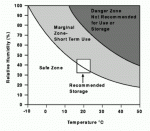sweetbeats
Reel deep thoughts...
+1 to that ^^^^
thinbrownline would know.
Boom. Done.
Good luck finding a good machine. Keep us posted.
thinbrownline would know.
Boom. Done.
Good luck finding a good machine. Keep us posted.
I don't consider myself a "tape expert", but part of a community the, together, form a body of expertise. Others are much more knowledgeable about older tapes and their pitfalls and what to do about it. I sent a message to a listserv I'm part of that includes people who do archiving and transfers for a living. THEY are the tape experts. I'll see what comes back but you won't have answers today...like using analog tape compared to digital, you must have a certain degree of patience. I'll post as soon as I have any useful information.
[MENTION=66576]RRuskin[/MENTION] I hate to burst your bubble, but unfortunately we are starting to see even 206 exhibiting sticky shed issues.
Right, but people I know who do tape transfers professionally are starting to encounter sticky 206.
Dave........you’re right......but the problem we have is there’s a bunch of tapes and they may be labeled wrong and not all of them have old band material on them. So.........we have to play them first.
The tapes shouldn’t need baking. They are not sticky-shed prone tapes.

whatever you do DON'T bake the tape until you have tried playing it normally and exhausted all the possibilities, preferably trying at least 2 machines known to have no serious transport issues such as 'iffy' rubber belts or deteriorated pinch roller. As I understand it, baked tape will give you one or two passes at best, and if that doesn't work you've lost everything. I've never baked tape, so seek other more knowledgable advice if you really have to go down that 'last resort' road.
whatever you do DON'T bake the tape until you have tried playing it normally and exhausted all the possibilities, preferably trying at least 2 machines known to have no serious transport issues such as 'iffy' rubber belts or deteriorated pinch roller. As I understand it, baked tape will give you one or two passes at best, and if that doesn't work you've lost everything. I've never baked tape, so seek other more knowledgable advice if you really have to go down that 'last resort' road. On one occasion, and in total desperation with tape that was literally shedding as it passed over the play head, I swabbed the head clean with isopropyl every few feet of running, rewinding a little for every new start to allow the machine to get back up to speed. That obviously then needed a huge amount of 'stitching back together' using digital editing software. A pretty crazy and risky thing to have done, I admit. Eventually I managed to recover a 'passable' recording (luckily it was mostly speech rather than music, (a family's memento of a wedding ceremony many, many years before), so 'speech quality only' was sufficient Perhaps that was the one occasion when baking would have been a better solution. Having 'rescued' a few R2R tapes from the early 1970s (if not before), in all but that one case they played perfectly or nearly so, and I transferred them to digital media. I even suspect that correctly stored R2R tape will outlast any current digital media. I came upon this graph (below) showing ideal tape storage conditions, but I think it's probably too strict and that tape will survive across a somewhat wider area than that. Good luck with your old band recordings, I know how gratifying it is to recover something that you obviously loved doing, part of your life storyView attachment 105663
....I would also probably fast forward and rewind the tape before playing it and remember that 0.5mm tape is very thin and as stated above very easily stretch.
The tapes shouldn’t need baking. They are not sticky-shed prone tapes.
According to Richard Hess they may show some signs of shedding - see about halfway down this document...
-Degrading Tapes – Richard L Hess—Audio Tape Restoration Tips & Notes
In my experience Scotch degrades at a slower rate than Ampex and most Scotch tapes are still playable with a little cleaning. The only Scotch tapes I've baked have been some reels of 966.
